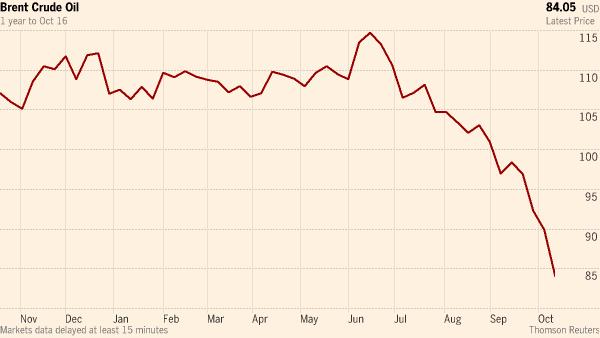Geoff Dyer in Washington and Ed Crooks in New York.
By encouraging oil prices to fall, Saudi Arabia is taking a calculated gamble in its already strained relationship with the US, hoping that the potential damage to America’s shale industry will be offset by the geopolitical and economic prizes on offer to Washington.
At a time when the US and Saudi Arabia are fighting a new war together in Iraq and Syria, the Saudis have taken the bold step of asserting their pivotal role in the oil market and subtly squeezing the finances of some of America’s fledgling shale companies.
Yet, at the same time, the falling oil price will deliver a de facto tax cut for American consumers and – if sustained – will hit both Russia and Iran at a time when Washington is trying to pressure both countries.
Deborah Gordon, director of the energy and climate programme at the Carnegie Endowment, sees the Saudi pressure on oil prices as a carefully calibrated move that will not alienate allies but will cause problems for rivals and foes such as Russia and Iran.
“The Saudis seem to have concluded that this could be a game-changer for them,” she says. “They get several benefits without hurting the people they do not want to hurt.”
With global demand for oil slowing sharply and US production surging, Saudi Arabia faced a choice. It could have cut production to stabilise the market, shouldering the burden itself. Instead, it appears so far to have decided to let the price fall, indicating that it would be happy with an oil price around $80, rather than the $100 it has previously backed.
With new oil production in the US and elsewhere calling into question the future of Opec, the Saudis have reminded the oil market of their central role in determining prices.
Sustained lower prices could push the Saudi budget into deficit – raising new questions about political stability – but many analysts believe the kingdom’s huge foreign exchange reserves allow it to withstand a period of reduced revenue.
The Saudi decision comes at a time of high tension in its relationship with the US. For the past year, the two countries have been at loggerheads over the Obama administration’s attempts to strike a nuclear deal with Iran, which the Saudis see as a naive accommodation of a perennial rival. At the same time, Saudi Arabia has become a key part of the US-led coalition fighting Islamist militants in Iraq and Syria.

By pushing oil prices lower, Saudi Arabia is helping to orchestrate some geopolitical outcomes that will be very welcome in Washington. The plunging price will create further problems for the Russian economy, which is already suffering under the weight of US and European sanctions in response to its intervention in Ukraine.
Iran’s economy will also be affected by lower oil prices although the impact for the nuclear talks is harder to judge. While Saudi Arabia would like the negotiations to fail, it is possible that the prospect of lower oil revenues could encourage Tehran to make concessions to the US because it will be even keener to win relief from international sanctions.
With global growth slowing, lower oil prices are good news for the weakening economies in Europe and China – who are also among Saudi Arabia’s biggest customers – and will bring direct benefits to US consumers. In spite of the shale boom, the US is still one of the world’s largest net importers of oil.
Ed Morse of Citigroup estimates that $80 Brent crude is equivalent to a tax cut averaging almost $600 for every household in the US. Jason Bordoff, a former energy official with President Obama’s administration, now director of the Center on Global Energy Policy at Columbia University, said: “For the US economy and US consumers, lower oil prices are a great thing. They will create winners and losers in different places. There is a downside. But the upside is greater than the downside.”
“There is not a whiff of collusion” between the US and the Saudis, says Bob McNally, a former George W Bush administration official now president of the Rapidan Group, unlike in the 1980s when lower prices helped pressure the Soviet economy amid rumours of a deal between Riyadh and the Reagan administration. “But for the US, there are pleasing aspects to this.”
Against all those potential benefits for the US, however, the lower prices also appear to be designed to put a brake on the shale oil boom, which has been the most significant upheaval in global energy for a decade.
The International Energy Agency, the watchdog backed by rich countries’ governments, reported recently that US production of liquid petroleum, including crude oil and natural gas liquids such as propane, had drawn level with that of Saudi Arabia over the summer.

Prices at these levels or lower will put financial strain on US shale producers, and several of them are already talking about having to cut back their capital spending. If they do cut, then next year US oil production growth will slow, and could even go into reverse if prices fall even lower.
http://www.ft.com/intl/cms/s/2/e2fd08c6-554c-11e4-b750-00144feab7de.html#axzz3GZ2l5qvG
 would enable you to enjoy an array of other services such as Member Rankings, User Groups, Own Posts & Profile, Exclusive Research, Live Chat Box etc..
would enable you to enjoy an array of other services such as Member Rankings, User Groups, Own Posts & Profile, Exclusive Research, Live Chat Box etc.. 
 Home
Home

















